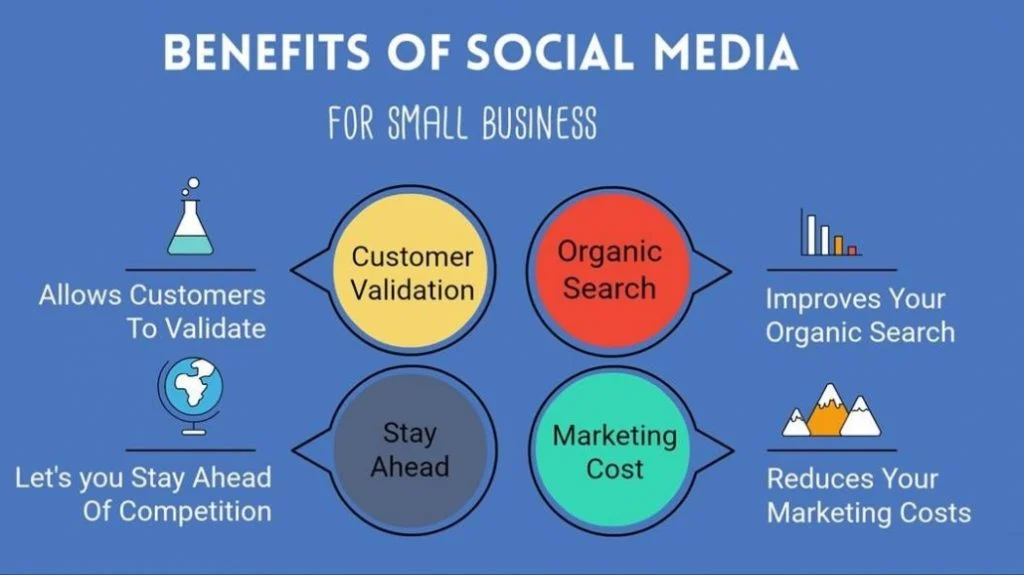
Social media marketing has become an essential strategy for businesses of all sizes. By leveraging platforms like Facebook, Instagram, LinkedIn, and Twitter, companies can reach a broad audience, engage customers, and enhance their brand’s visibility. Below are some of the key benefits of social media marketing for businesses:
Social media marketing offers businesses a range of benefits that can enhance their visibility, drive sales, and foster customer engagement. By leveraging platforms like Facebook, Instagram, and LinkedIn, businesses can increase brand awareness, directly communicate with their audience, and gain valuable customer insights. Social media also provides cost-effective marketing opportunities with advanced targeting options, boosting website traffic and conversion rates. Additionally, it enables global reach, supports influencer marketing, and helps build brand loyalty through real-time interactions. With valuable analytics, businesses can refine their strategies and stay competitive. Explore how social media marketing can transform your business and deliver long-term growth.
1. Increased Brand Awareness
One of the primary advantages of social media marketing is the ability to boost brand awareness. With billions of active users across various platforms, businesses can tap into a vast audience. By regularly posting relevant and engaging content, businesses can increase their visibility, making it easier for potential customers to recognize and remember the brand.
Social media provides a cost-effective way to get in front of a global audience without spending large amounts on traditional advertising. A consistent presence on social media, coupled with meaningful interactions with users, helps build a brand’s identity and recognition over time.
2. Direct Communication with Customers
Social media allows businesses to communicate directly with their customers, creating a more personal and interactive relationship. This two-way communication facilitates real-time feedback, queries, and discussions. Customers can reach out with questions or concerns, and businesses can respond quickly, improving customer satisfaction.
This direct engagement builds trust and transparency, helping businesses foster stronger relationships with their audience. Additionally, social media platforms often provide messaging features, allowing companies to offer personalized customer support.
3. Cost-Effective Marketing
Compared to traditional advertising methods, social media marketing is highly cost-effective. Most social media platforms are free to join and use, allowing businesses to promote their products and services at minimal cost. While paid advertising options are available, even these tend to be more affordable than conventional advertising, such as TV commercials, print ads, or billboards.
Businesses can set budgets for social media ads that suit their financial resources, making it accessible for small and large companies alike. Organic content—such as blog posts, videos, or images—can go viral without requiring paid promotion, offering tremendous exposure without additional costs.
4. Enhanced Targeting Capabilities
Social media platforms offer sophisticated targeting options for businesses. Companies can reach specific audiences based on demographics, interests, behaviors, geographic location, and more. For instance, Facebook and Instagram Ads allow businesses to target potential customers based on their age, gender, hobbies, purchase history, and even job titles.
This precise targeting helps businesses maximize their marketing efforts by ensuring that their ads are shown to people who are more likely to be interested in their products or services. With better targeting, companies can increase the chances of conversion and get a better return on investment (ROI).
5. Increased Website Traffic
Social media is an excellent tool for driving traffic to a business’s website. By including links to their website in social media posts, ads, and profiles, businesses can encourage users to click through and explore their products or services in more detail.
Sharing high-quality content like blog posts, infographics, and videos can also generate interest and motivate people to visit the website for more information. Additionally, paid social media ads can direct users to specific landing pages, product pages, or sign-up forms, increasing the chances of conversions.
6. Boost in Sales and Conversion Rates
One of the most significant benefits of social media marketing is its ability to drive sales. With social commerce features available on platforms like Instagram and Facebook, businesses can sell products directly through social media, streamlining the purchasing process.
Moreover, the ability to promote products through influencer marketing, ads, and organic posts can lead to higher conversion rates. Customers often use social media to discover new products, read reviews, and make purchase decisions. An effective social media strategy can capture these users at different stages of the buying journey, from awareness to conversion.
7. Valuable Customer Insights
Social media platforms provide businesses with a wealth of data and analytics, offering insights into customer behavior, preferences, and engagement patterns. Through social media analytics, businesses can track key metrics such as likes, shares, comments, and clicks. They can also assess the performance of their content and campaigns, identifying what resonates with their audience and what needs improvement.
By understanding their audience better, businesses can make more informed marketing decisions, create more relevant content, and refine their targeting strategies. These insights can also help businesses identify trends, optimize customer service, and improve their overall marketing strategy.
8. Brand Loyalty and Customer Retention
Social media marketing helps businesses foster brand loyalty and retain customers by creating meaningful connections with their audience. Regular engagement with customers through comments, direct messages, and social media posts helps build a sense of community and belonging.
Social media allows businesses to reward loyal customers with exclusive promotions, discounts, and giveaways, further encouraging them to stay connected with the brand. A strong social media presence keeps a brand top-of-mind, making it more likely that customers will return for future purchases.
9. Real-Time Feedback and Market Research
Social media provides an excellent platform for businesses to gather real-time feedback from their customers. Whether through comments, reviews, or surveys, companies can gain valuable insights into customer satisfaction, product preferences, and areas for improvement.
Additionally, businesses can conduct informal market research by observing conversations and trends in their industry. By monitoring competitors and tracking industry-specific hashtags, companies can stay ahead of market changes and adjust their strategies accordingly.
10. Better Competitor Analysis
Social media offers a valuable opportunity to monitor competitors and their marketing strategies. Businesses can observe the types of content their competitors post, how they interact with their followers, and the kinds of promotions or campaigns they run.
This competitive analysis helps businesses identify opportunities to differentiate themselves and improve their marketing efforts. It also allows them to spot gaps in the market and potential areas for innovation.
11. Global Reach and Expansion
Social media allows businesses to expand beyond their local markets and reach global audiences. Platforms like Facebook, Twitter, and Instagram are available worldwide, providing businesses with an opportunity to connect with international customers.
With targeted ads and localization strategies, companies can promote their products and services to different countries and cultures, growing their global presence. This is especially beneficial for e-commerce businesses that can ship products worldwide, as social media facilitates market expansion without significant investment in physical infrastructure.
12. Influencer and Affiliate Marketing
One of the most powerful trends in social media marketing is influencer marketing. Social media influencers, who have built a loyal following, can promote products and services to their audience, offering businesses a way to reach new customers. Influencers are often viewed as more authentic and trustworthy than traditional celebrities, making their endorsements highly effective in driving sales.
Additionally, businesses can collaborate with affiliates—individuals or other companies who promote their products in exchange for a commission. These partnerships help expand a brand’s reach and attract new customers.

